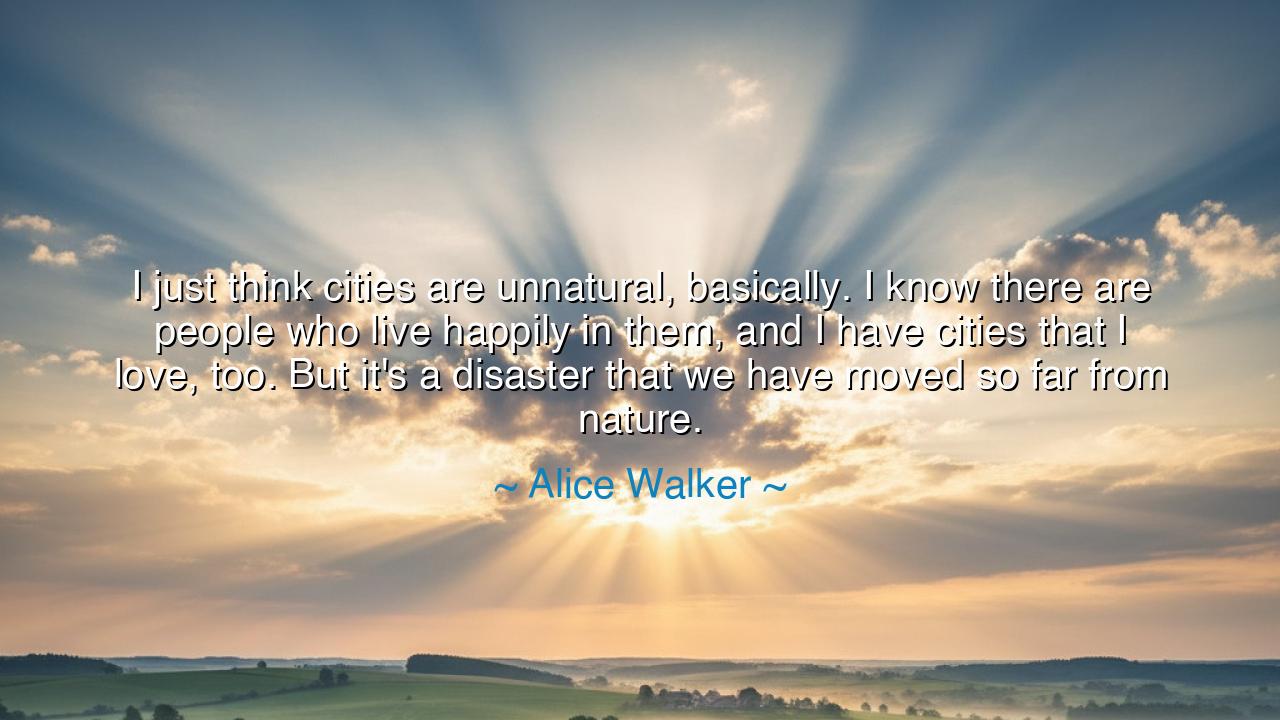
I just think cities are unnatural, basically. I know there are
I just think cities are unnatural, basically. I know there are people who live happily in them, and I have cities that I love, too. But it's a disaster that we have moved so far from nature.






Alice Walker, the seer of human souls and teller of truths, once proclaimed: “I just think cities are unnatural, basically. I know there are people who live happily in them, and I have cities that I love, too. But it's a disaster that we have moved so far from nature.” These words, though tenderly spoken, resound with the weight of prophecy. For she names a wound that has deepened through the centuries — the fracture between human beings and nature, the estrangement of the child from the mother who gave them life.
The meaning of this reflection lies in the recognition that cities, though monuments of human ingenuity, often separate us from the living pulse of the earth. Concrete and steel rise where once there were forests and fields, and men and women, though surrounded by millions of others, often find themselves spiritually starved. Walker does not deny that joy can be found in cities, nor that they have their beauty, but she warns that when humanity moves too far from its natural roots, disaster follows: sickness of body, weariness of soul, and imbalance in the world itself.
The origin of this wisdom can be traced back to the ancient ways, when humanity lived in closer union with the cycles of the land. Our ancestors watched the stars to know the seasons, listened to rivers to know the rains, and honored animals as fellow travelers in existence. In their myths, the earth was not dead matter but a living spirit. Over time, however, the rise of kingdoms and empires brought stone and wall, separating man from soil and sky. Walker’s voice recalls the old truth: that to forsake the earth entirely is to forsake ourselves.
History offers examples of this forgetting. The fall of Babylon was not only political but ecological; its rivers were diverted, its land exhausted, its gardens lost beneath the weight of conquest and neglect. More recently, the choking smog of the Industrial Revolution turned skies black and rivers into poison. In these moments, humanity’s pursuit of power within cities became blindness to the natural order, and the price was suffering. In contrast, when societies aligned themselves with nature — as the Incas did, building terraces that worked with the mountain rather than against it — their civilizations flourished in balance, though harsh their environment.
Yet Walker’s words are not despair alone; they are also invitation. For to say we are “far from nature” is to imply that we may return. A city dweller may plant a garden on a balcony, walk among trees, listen to birdsong at dawn. A nation may restore forests, cleanse rivers, and design dwellings that honor the earth rather than consume her. The disaster is not final if hearts awaken. It is within the power of humanity to turn again toward the soil, to remember the breath of the wind, to honor the sacred waters.
The lesson for future generations is clear: do not despise the achievements of cities, but do not let them blind you to the deeper truth of your belonging to nature. Remember that every meal you eat, every breath you take, every heartbeat within you flows from the earth’s gifts. Technology may dazzle, towers may rise, but without rivers, forests, and fields, no city can endure. Therefore, live not as strangers to the earth but as her children.
Practical action must follow. Step outside when you can, and let the sun’s warmth remind you of your place in the cosmos. Grow something, however small, to remember the sacredness of life. Support those who protect forests, clean waters, and the air itself. And within cities, demand spaces where nature may live alongside you — parks, gardens, rivers not buried but flowing. For in every act of reconnection, we heal not only the earth but our own weary spirits.
Thus, Alice Walker’s words stand as both warning and wisdom. Cities may be wondrous, but if they pull us too far from nature, they become prisons of our own making. The task before us is not to abandon civilization but to weave it again into harmony with the earth. For in returning to her embrace, humanity will rediscover its wholeness, and the balance that sustains life will be restored.






AAdministratorAdministrator
Welcome, honored guests. Please leave a comment, we will respond soon